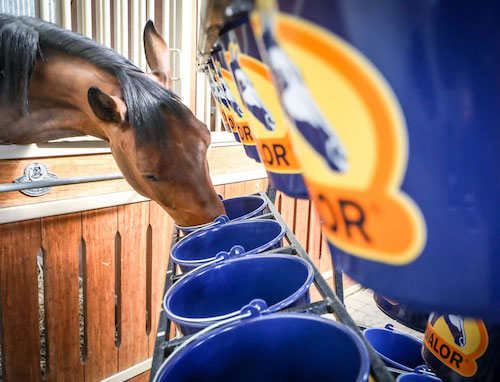
Internal Systems & Digestion Supplements for Horses

From the steppe...
Horses are herd animals by nature that once lived on the Eurasian Steppe. They are creatures of habit must always have the opportunity to flee. Horses are also herbivores that are accustomed to movement through grazing. Originally, they would graze practically day and night, spending as much as 16 hours a day nibbling on grasses and herbs that were low in nutrients. This gave them a constant intake of high-fibre food in small amounts. Their grass was high in fibre but low in sugar and protein. The range of herbs and grasses available to them was so diverse that they had access to many different vitamins and minerals. The natural diet of horses was therefore high in fibre and contained plenty of vitamins and minerals, but little sugar and protein and even less starch.
...to the stable
The domestication of the horse upturned this kind of life completely. Horses were put in front of ploughs and wagons or were ridden. Horses now had hard work to do, and grass alone no longer provided enough energy. This deficit was made up for with cereals. Gradually horse evolved from wild animals into loyal companions. More and more, they were used for leisure and sport, developing into today's modern horse.
Horses are now used in a wide variety of equestrian disciplines: jumping, dressage, eventing, racing, vaulting, endurance. There are also significant differences amongst breeds.
understanding is key
The daily lives of these horses look completely different than those of wild horses. They have much less access to pasture, are often stabled alone, and may be ridden just a few times each week. Although many horse owners do all they can to make the lives of their equine companions as pleasant as possible, modern stable life still brings many challenges.
Equine diets have also changed greatly since domestication. The forage that horses eat now contains more energy and protein. In addition, pastures contain a much more limited range of herbs, which means that their vitamin and mineral content is much lower. Depending on the season, (sport) horses may only be allowed to graze for a few hours a day and are given concentrates 2 to 3 times a day. But whilst the lives of today's domesticated horses may be completely different from those of their free-roaming ancestors, their digestive systems are the same. The big differences in what horses ate then and what they eat now can cause problems at various places in the digestive system. Good knowledge of anatomy and the digestion process is useful in preventing these problems.
Good digestive health is essential for the top performance and wellbeing of your horse.
The horse's gut is populated by billions of bacteria and any disruption to the functioning of this is detrimental to your horses health.
Horses also suffer from stress and thus ulcers are common place amongst all types of horses.
Cavalor provides gastric products (Gastro Aid) to aid the horses stomach function and hind gut products (Vitaflora) to aid the colon.
Vitaflora is particularly recommended after a course of antibiotics.
In addition Cavalor provide solutions for other metabolic imbalances in the Liver (Hepatoliq), general digestion (Digest), for faster relief of gastric issues (Gastro Aid Paste), severe disturbances (Emergency 911) and for horses suffering with metabolic disturbances leading to foot problems (Laminaid)
tips to keep your horse healthy
We’re committed to good health inside and out. Our products – nutrition, supplements and care products – reflect what your horse needs in every sporting achievement, stage of life or special need. Because horses that are happy and healthy are our most valuable asset.


















